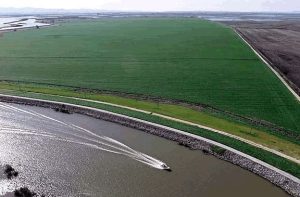Update 2:30 p.m.: The state’s water board director says he will decide by Friday whether to accept a water usage reduction proposal offered by a group of Delta farmers. The decision on the concession listed below could set the tone for future negotiation as the drought persists.
Original post 7:59 a.m.: Sacramento, CA — Some California farmers are offering to cut their water usage to avoid possible harsher restrictions later this summer.
As the state’s drought lingers on, farmers in the Sacramento-San Joaquin River Delta, some who have the oldest water rights, are presenting a voluntarily usage reduction plan to state water officials today. The deal proposes that farmers would either take less river water for irrigation or leave a quarter of their crops unplanted. There is no word on how many farmers are involved or will participate in the deal. If the state accepts the proposal, it could become a model for farmers throughout California, who also are facing deep cutbacks, as this is the second consecutive year that junior water-rights holders have been ordered to stop pumping river water for irrigating crops.
An attorney for the coalition of Delta farmers says, state water officials have responded positively to the plan and they are continuing to work with officials with the State Water Resources Control Board to fine tune the details.
Additionally, the state water board yesterday approved guidelines for $19 million in funding to help communities, non-profits, and public agencies meet their emergency drinking water needs. “As we enter a fourth year of severe drought, more communities are likely to face difficulties with their water supplies and delivering safe drinking water,” said Darrin Polhemus, deputy director of the State Water Board’s Division of Financial Assistance. “These guidelines will help streamline the process of identifying communities with the most immediate need and who don’t have the necessary resources to respond to their situation, and in getting funds as quickly as possible to them to secure their drinking water supplies.”
The board will coordinate with other water agencies across the state to identify communities whose water supplies have been impacted by contamination or drought, and need financial assistance to maintain a safe drinking water supply.


